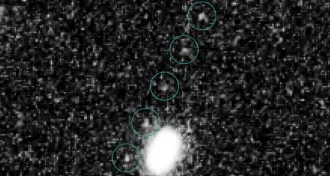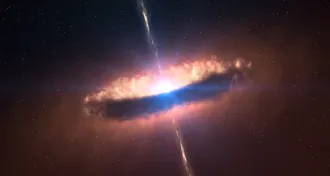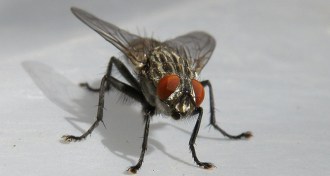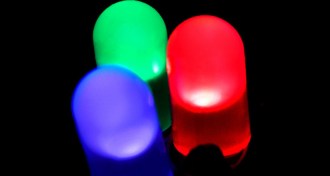Science Ticker
A roundup of research and breaking news
Sign up for our newsletter
We summarize the week's scientific breakthroughs every Thursday.
-
 Astronomy
AstronomySecond stop planned for mission to Pluto
Scientists identify three possible targets for the New Horizons probe after it visits the former planet.
-
 Astronomy
AstronomyCosmic jets re-created in a lab
Physicists have recreated in a lab the plasma jets that erupt from young stars and black holes.
-
 Planetary Science
Planetary ScienceMAVEN gives first look at Mars’ escaping atmosphere
Bits of Mars have been caught in the act of floating off into space.
-
 Genetics
GeneticsHouse fly’s genome hints at detox genes
The house fly's DNA instructions include extra genes that may help detoxify and decompose animal waste.
-
 Health & Medicine
Health & MedicineDallas health worker is first to catch Ebola in U.S.
A health worker in Dallas has Ebola. She is the first to catch the virus in the U.S.
-
 Environment
EnvironmentWorld’s first full-scale clean coal plant now up and running
After decades of delays, technology that cuts carbon emissions from commercial power plants has made its worldwide debut.
-
 Microbes
MicrobesGut bacteria protein linked to anorexia and bulimia
Gut bacteria may play a role in eating disorders, a new study suggests.
-
 Health & Medicine
Health & MedicineFirst Ebola patient diagnosed in U.S. dies
Thomas Eric Duncan, who contracted the virus in Liberia and fell ill four days after traveling to Dallas, died October 8.
-
 Tech
TechMicroscopy techniques win Nobel Prize in chemistry
The award goes to three scientists who developed fluorescence microscopy, which allows researchers to see single molecules just a billionth of a meter across.
-
 Physics
PhysicsBlue light-emitting diode earns three researchers Nobel Prize in physics
The invention of blue light-emitting diodes has been awarded the 2014 Nobel Prize in physics.
-
 Planetary Science
Planetary ScienceSun may make most of the water on moon’s surface
A constant stream of particles from the sun bombarding the moon's surface may be the source of most lunar water.
-
 Neuroscience
NeuroscienceBrain’s map cells win three scientists Nobel Prize
The discovery of brain cells that provide a sort of “inner GPS” has been awarded the 2014 Nobel Prize for physiology or medicine.